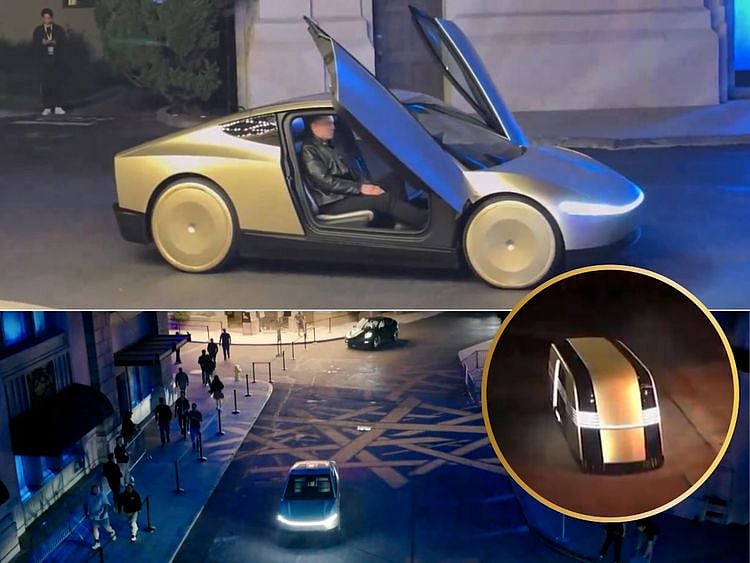Telsa CEO Elon Musk unveils robotaxi and robovan: 7 quick takes
An autonomous future? What tech billionaire unveiled at ‘We, Robot’ event

Tesla CEO Elon Musk has finally unveiled the no-pedals, no-steering-wheel “Robotaxis” late on Thursday during the "We, Robot Party" in California.
The event, part-vision setting and part-demo of what an autonomous transport future might look like, was held at Warner Brothers Discovery studio in Burbank where Musk arrived in a “cybercab” – without a steering wheel and no pedals.
Disclaimer
It kicked off with a legal disclaimer stating that all statements were “forward-looking”.
“We have quite a show for you tonight. I think you're going to like it," Musk said, arriving in the robottaxi, the Cybercab.
“There are 20 more where that came from. As you can see, the cars are just going by with no people.” He added that there were 50 “fully-autonomous” cars present, including Model Ys and the Cybercabs.
He offered attendees a chance to take a ride in the driverless Cybercab.
Our key takeaways:
#1. 'Individualised mass transit' system
The event doubled down on Tesla’s vision of a future with personalised autonomous transport. The much-awaited event did not disappoint. It not only discussed the possibility of an “individualised mass transit system” – but gave an actual demonstration, with at least 20 working Cybercab demo units.
Musk explained: “The cost of autonomous transport will be so low that you can think of it like individualised mass transit. The average cost of a bus per mile for a city, not the ticket price because that is subsidised, is about $1 a mile.
"We think the cost of the Cybercab, over time, will be around 20 cents a mile for operating costs. And with taxes and other factors, it would likely be 30 or 40 cents per mile.”
#2. Cost of the robotaxi, or 'Cybercab': $30,000
He also confirmed that the Cybercab would be available for purchase and estimated the price to be below $30,000. This is lower than any other vehicle that Tesla has produced till date.
Musk, however, has in the past demonstrated that the numbers and impossible timelines he mentions are way off the mark, though they may eventually happen.
#3. 'Unsupervised FSD' rollout in Texas, California
The tech billionaire announced that Tesla plans to start fully autonomous, unsupervised Full Self-Driving (uFSD) operations in Texas and California next year. It's not immediately clear if the regulatory hurdles had been sorted to roll out (uFSD).
#4. Cybercab production: from 2026
He expects production of the Cybercab, optimised for U.S. transport, to begin “around 2026”.
Must, however, noted that he tends to be optimistic with timeframes – setting the goal for production before 2027.
#5. Inductive charging
Describing the experience of riding in a Cybercab, Musk said: "It feels great to be in a car with no steering wheel, pedals, or controls." He also introduced a new feature: inductive charging. "The robottaxi has no plug. It just goes over the inductive charger and charges."
#6. Robovan
In addition to the Cybercab, Musk debuted the "Roven" (often referred to as the RoboVan), a larger vehicle designed for high-density transport.
“This can carry up to 20 people or be used for goods transport within a city,” he said, adding that the Roven is aimed at bringing the cost of travel down to 5 or 10 cents a mile.
#7. Optimus humanoid: $20k to $30k
Musk also touched on Tesla's progress with the Optimus humanoid robot. “Everything we've developed for our cars—batteries, power electronics, advanced motors, gearboxes, software, AI inference computer—applies to a humanoid robot,” he said.
The Optimus robot has seen significant advancements, and Musk predicts that, at scale, it could cost between $20,000 and $30,000. He emphasized that the robot will be able to perform a variety of tasks, including teaching, babysitting, walking pets, mowing lawns, and even serving drinks.
"This will be the biggest product ever of any kind," Musk concluded.
Sign up for the Daily Briefing
Get the latest news and updates straight to your inbox
Network Links
GN StoreDownload our app
© Al Nisr Publishing LLC 2026. All rights reserved.